英语代词中考总复习总结
2020年英语中考归纳复习专题:代词
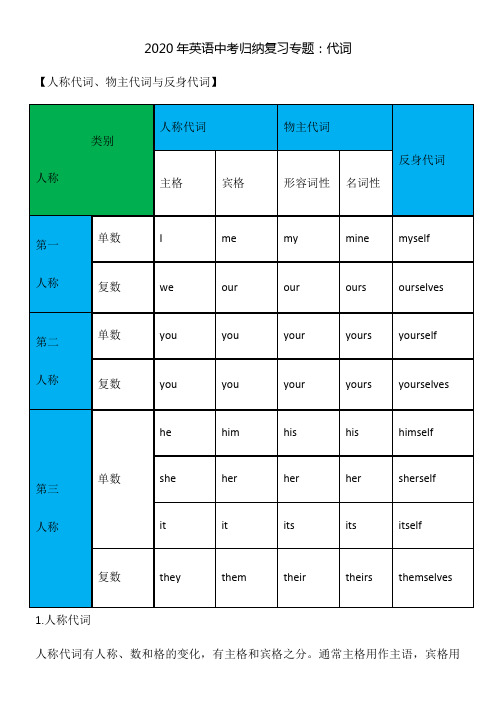
2020年英语中考归纳复习专题:代词【人称代词、物主代词与反身代词】1.人称代词人称代词有人称、数和格的变化,有主格和宾格之分。
通常主格用作主语,宾格用作宾语或表语。
(1)主格通常用在动词前作主语。
如:I like apples.我喜欢苹果。
(2)宾格通常用在动词或介词后作宾语。
如:He often helps me learn English.他经常帮助我学习英语。
(动词后作宾语)My younger brother is ill.We’re worried about him.我弟弟生病了,我们很担心他。
(介词后作宾语)2.物主代词物主代词表示所属关系,分为形容词性物主代词和名词性物主代词,有人称和数之分。
形容词性物主代词具有形容词的功能,不能单独使用,用在名词前作限定词。
名词性物主代词具有名词的特征,其后不跟名词,名词性物主代词=形容词性物主代词+名词。
如:This pen is mine.(=This is my pen.)这支钢笔是我的。
3.反身代词反身代词表示“某人自己”的意思,是人称代词的强调形式,一般用在宾语和主语是同一人的情况下,或用来强调某人亲自做某事。
其变化规则为:单数后面加self,复数后面加selves。
一般用作动词或介词的宾语。
反身代词的常见搭配: enjoy oneself 玩得开心;过得愉快teach oneself=learn...by oneself 自学by oneself=alone 独自hurt oneself 伤着自己help oneself to sth.随便吃点东西look after oneself 照顾自己leave sb.by oneself 把某人单独留下dress oneself 自己穿衣服lose oneself in陶醉于……;沉浸于……【考点训练1】1.I think it’s important for children to help _____ (they) parents with housework.2.Don’t worry about____.I’m old enough to look after ______.(I)3.____ (we) computers are new,but _____ (they) are old.4.I have a cat and ___ name is Mimi. ()A.its’B.it’sC.itD.itsTheir me myself Our theirs D【不定代词】不明确指代某个(些)人、某个(些)事物而起名词或形容词作用的代词叫做不定代词。
中考英语:名词代词冠词数词介词形容词副词重点复习
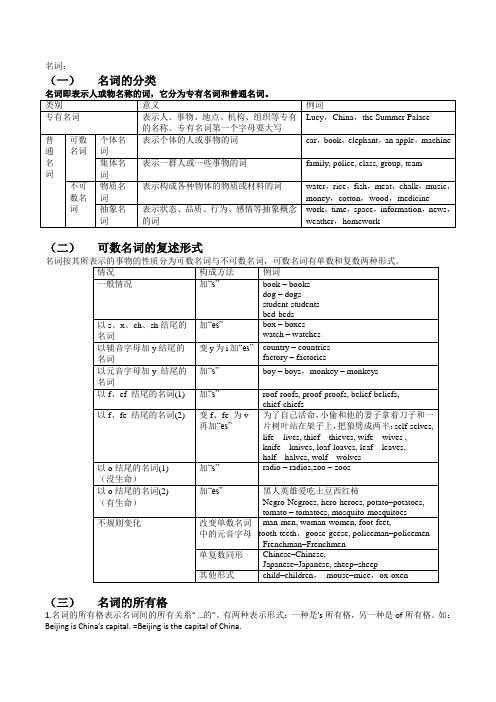
名词:(一)名词的分类(二)可数名词的复述形式(三)名词的所有格1.名词的所有格表示名词间的所有关系“…的”。
有两种表示形式:一种是’s所有格,另一种是of所有格。
如:Beijing is China’s capital. =Beijing is the capital of China.2. 名词所有格的构成方法1)单数名词后加“’ s”:Tom ’ s book ;my friend’ s uncle2)不以s结尾的复数名词的所有格,仍按惯例加“’ s” :Children’ s Day ;men’ s shoes3)以s结尾的复数名词,则在s后加“’”即可:Teachers ’ Day ;two weeks ’ holiday4)用of加名词,构成所属关系的短语,主要用于表示无生命名词的所有关系the color of the wall ;a picture of the classroom3. 名词所有格的几个注意点1)可用名词所有格表示地点, 地点名词习惯上省略:my aunt’s ( home);go to the teachers’ ( office)2)有些名词的所有格可用两种形式:the cat’s name / the name of the cat;China’s capital/ the capital of China 3)表示两人共同拥有,在最后一个名词后加“’s”Lucy and Lily’s room 露西和莉莉的房间(两人共有一间房间)请区别:Lucy’s and Lily’s rooms露西的房间和莉莉的房间(两人各有一间房间)4)双重所有格有两种形式:①of+名词所有格;②of+名词性物主代词。
如:He is a friend of my brother’s. ;Is she a daughter of yours?(四)注意:1)名词做主语时,应注意名词的数,避免主谓不一致。
中考英语专题复习:代词
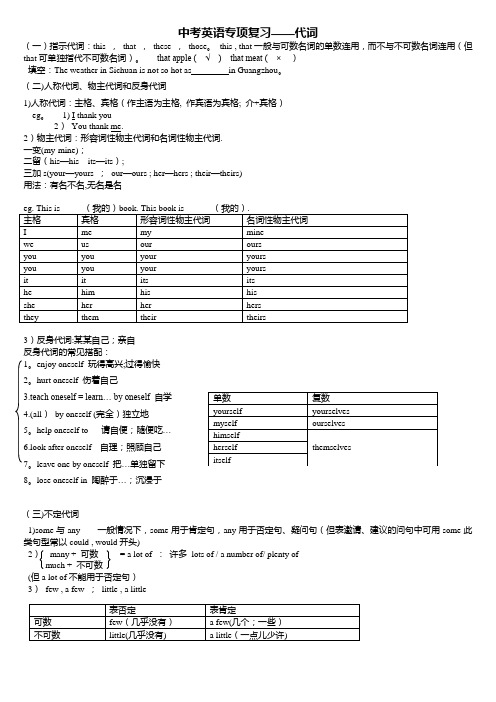
中考英语专项复习——代词(一)指示代词:this , that , these , those 。
this , that 一般与可数名词的单数连用,而不与不可数名词连用(但that 可单独指代不可数名词)。
that apple ( √ ) that meat ( × )填空:The weather in Sichuan is not so hot as __ in Guangzhou 。
(二)人称代词、物主代词和反身代词1)人称代词:主格、宾格(作主语为主格, 作宾语为宾格; 介+宾格)eg 。
1) I thank you2) You thank me.2)物主代词:形容词性物主代词和名词性物主代词.一变(my-mine);二留(his —his its —its );三加s(your —yours ; our —ours ; her —hers ; their —theirs)用法:有名不名,无名是名3)反身代词:某某自己;亲自反身代词的常见搭配:1。
enjoy oneself 玩得高兴;过得愉快2。
hurt oneself 伤着自己3.teach oneself = learn… by oneself 自学4.(all ) by oneself (完全)独立地5。
help oneself to 请自便;随便吃…6.look after oneself 自理;照顾自己7。
leave one by oneself 把…单独留下8。
lose oneself in 陶醉于…;沉浸于(三)不定代词1)some与any一般情况下,some 用于肯定句,any 用于否定句、疑问句(但表邀请、建议的问句中可用some-此类句型常以could , would 开头)2) many + 可数 = a lot of : 许多 lots of / a number of/ plenty ofmuch + 不可数(但a lot of 不能用于否定句)3) few , a few ; little , a little①。
人教版英语中考总复习---代词
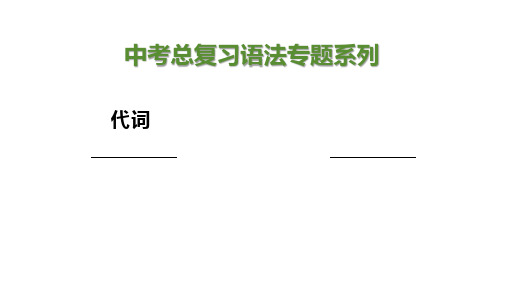
4. another 另一个 another ten minutes=ten more minutes
5. it,one, that 做代词的区别 ①it 指同类同物,指上文提及的同一个事物或情况 She enjoys the story because it is very interesting. ②one 指同类异物 ,泛指同类事物中的一个,复数形式为ones My sweater is very old. I’ll buy a new one. ③ that 代替前面提到的名词,以避免重复用于比较重,复数形式 those The weather in Shenyang is colder than that in Guangzhou in winter.
her hers they them their theirs its its
反身代词
自学 玩得高兴
自学 自己穿衣 随便用self enjoy oneself teach oneself dress oneself help oneself to by oneself say to oneself
不定代词的考点
1.each of +名/代 both/all of+
none of+
2. other 形容词,其他的
the other (两者中的另一个) :
one....,and the other..../ the other students 其余全部的
3. others=other +名词复数 表示 其他的人或物 some...others...
中考总复习语法专题系列
代词
形容词性物主代词 & 名词性物主代词
初中中考英语语法总复习人称代词物主代词反身代词

人称、物主、反身代词知识精讲一、代词的概念1. 定义:代词是代替名词的一种词类。
大多数代词具有名词和形容词的功能。
2. 分类:英语中的代词,按其意义、特征及在句中的作用分为:人称代词、物主代词、反身代词、指示代词、疑问代词、关系代词和不定代词等。
二、人称代词1. 人称代词定义:表示“我,你,他,她,它,我们,你们,他们”的词叫做人称代词。
人称代词分主格和宾格两类,有单、复数之分。
如:We are the best. 我们是最棒的。
Please give us more time to finish it.请给我们更多的时间来完成它。
2. 人称代词形式:3. 人称代词的用法:1). 主格:做主语。
如:You are good students. 你们是好学生。
2). 宾格:做宾语。
I love you. 我爱你。
如:She is looking at you.她正在看你。
3). 人称代词的语序:当几个人称代词并列充当主语时,单数形式(二、三、一)You, he and I复数形式(一、二、三)We, you and they第三人称男女两性并用时,男先女后He and she4). it 的用法:(1). 指前文提到过的事物。
如:This isn’t my book. It’s Dufu’s.这不是我的书。
它是杜福的。
(2). 指代时间/季节/天气/距离。
如:Which season is it? 现在是什么季节?It’s spring now. 现在是春天。
What’s the weather like today? 今天天气怎样?It’s hot. 今天很热。
How far is it? 那里有多远?It’s 10 kilometers. 10千米。
(3). 特殊句型It’s time to do sth. 该做......的时间了如:It’s time to go to bed. 该睡觉了。
2024年中考英语核心语法点复习代词03

—Is that Tom ?
—This is Tom speaking
疑问代词
类型
/
/
主语
宾语
表语
定语
where/when/why/how是疑问副词
指人
主格
Who
√
√
√
宾格
Whom
√
人&物
属格
Whose
√
√
√
√
指物
主格
Which
√
√
宾格
What
√
√
√
√
不定代词
例:It is important for her toe to the party.
3.It takes sb.+时间+to do sth. 做…要花费某人…
例:It took thousands of people many years to build the Great Wall.
三、作形式宾语替代不定式
——What is in the box? ——Nothing.
——Is there anything in the sky? ——Nothing.
2.it/one/that/those
it
同类同物
one
同类不同物
that
用于比较结构中,代指前面提到的单数名词/不可数名词,避免重复
those
用于比较结构中,代指前面提到的复数名词,避免重复
例:It is kind of you to say so.
2.It is +adj+(for sb.) to do sth.
中考复习——代词

any- 任何 anything, anybody, anyone,
no-没有 nothing, nobody, no one,
every- 每个 everything everybody everyone
动词 单数
*** Could you/ Can you / Would you please….? 表示请求。 这时希望得到对方的肯定回答,用___s_o_m__e_th_i_n_g_、__somebody、someone 回答:___W__i_t_h_p_l_e_a_s_u_r_e._很__乐_ 意帮助你
某人自己的 sth of one’s own
人称代词的顺序
单数:你,他, 我 复数:我们,你们,他们 犯错误时:我, 你, 他
It的用法
形式主语:It is + adj. + for sb. to do sth. 对某人来说,做某事是….的 It takes sb time / money to do sth. 某人花费时间或金钱做某事
All
Any(任何1个)
None
*** either…. or…. 要么….要么…. neither…. nor…. 既不….也不….. not only … but also …. 不但…. 而且…. = both…. and…. 既….又….
= …. as well as…..
= …. and …. as well
一 人称代词、物主代词
主格: 某人,放句首作主语 宾格: 某人,动宾、介宾
a.型物代(所有格): 某人的,所有格+名词 n.型物代: 某人的某物
二 反身代词
第一、二人称反身代词 = 所有格+self/ selves 第三人称反身代词 = 宾格+self/ selves
中考英语语法复习代词

代词(1)人称代词的用法人称代词、物主代词和反身代词的基本结构人称代词在句于中作主语时用主格,作动词或介词的宾语时用宾格。
例如:应谈说between you and me,而不是between you and I。
● 人称代词在句子中作表语时,口语中常用宾格来代替主格。
例如:一Who's that?一-It's me.● 如果主语是并列的几个人,要将人称代词you放在最前面,I 放在最后面。
例如:You, he and I are all from Bejing.● it可用来指动物、无生命的东西或者指上文已提到的或下文将要提到的事物,也可以指自然现象、时间、距离、温度等。
例如:The horse is a useful animal. I like it very much. It's rather cold today, isn't it?[注]“it” 还是可用作引导词, 在句中作形式主语或形式宾语,代替由不定式或从句等所表示的真正主语或宾语。
例如:It is not easy to learn English well.(it 在句中作形式主语)it”可用在强调结构中,强调句子的某一成分。
● 形容词性物主代词只能用作定语,修饰名词:名词性物主代词相当于名词,在句子中可作主语、宾语和表语。
例如: This pen is hers,mine is in my office. Can I use yours?● 反身代词不能单独用作主语,也不能用作定语,但可以用来强调名词或代词,作名词或代词的同位语,有“亲自”的意思。
例如:I always have to do everything myself.● 反身代词可用作动词或介词的宾语。
当主语和宾语指的是同一人和物时,宾语应用反身代词而不用宾格人称代词。
例如:Her brother is too young to look after himself.(2)指示代词指示代词有this, these that, those, such和same它们通常在句子中充当主语、宾语、表语和定语。
总复习常见代词最全总结

中考英语总复习常见代词最全总结一、初中英语代词1.We should not ask___________ to do what we can't do ourselves.A. anotherB. the otherC. othersD. the others【答案】 D【解析】【分析】句意:我们不应该要求其他人做我们自己做不到的事。
A:another 另一个(三者或三者以上);B:the other另一个(两者之中);C:others 其他人,泛指;D:the others剩下所有人,其他所有。
根据what we can't do ourselves.可知与we相对之外的其他所有人,故选D。
【点评】考查不定代词辨析。
理解不定代词的词义和用法,根据句子结构,选择正确的不定代词。
2.Whenever you have trouble, you can ask your parents for help and don't keep ________ to yourself.A. themB. itC. itsD. him【答案】 B【解析】【分析】句意:你无论何时有麻烦,都可以向父母求助,不要把它留给自己。
them它们,it它,its它的,him他,此处代指前面的trouble用代词it,故选B。
【点评】考查物主代词,注意识记物主代词指代上文提到的事物这一用法。
3.Nowadays many people prefer to keep in touch with ______________ friends online. A. they B. them C. their D. theirs【答案】 C【解析】【分析】句意:现在年轻人更喜欢在网上跟他们的朋友保持联系。
A.他们,主格人称代词;B.他们,宾格人称代词;C.他们的,形容词性物主代词;D.他们的,名词性物主代词。
2024年中考初中英语专项复习之代词

代词一、人称代词:谁----who/whom主格I you he she it we you they宾格me you him her it us you them 主格做主语;宾格做宾语二、物主代词:谁的----whose形物代my your his her its our your their 名物代mine yours his hers its ours yours theirs 形物代后必须接名词;名物代后不需接名词三、反身代词:谁自己反myself yourself himself herself itself ourselves yourselves themselves 四、指示代词:this这,这个●指离得近的单数名词●打电话用语,介绍自己用this is...●介绍别人,用this is...that那,那个●指离得远的单数名词/不可数名词●打电话用语,询问对方用who’s that...?●指代前文提到的人或物(同类异物表特指)these这些●指离得近的复数名词those 那些●指离得远的复数名词●指代前文提到的人或物(同类异物表特指)注意:用指示代词问,要用人称代词回答Eg:Is this your pen?Yes,it is./No,it isn’t.Are these your pens?Yes,they are./No,they aren’t.五、相互代词:彼此,互相each other=one another彼此,互相each other’s=one another’s彼此的,互相的六、疑问词:疑问代词和疑问副词疑问代词:what (主语、宾语)什么which (主语、宾语)哪一个;哪一些who (主语、宾语)谁whom (宾语)谁(宾格)whose (定语)谁的what/which+n. (主语、宾语)什么....../哪个...... what与who问人的区别:What:询问人的职业Who: 询问人的身份What与which问事物的区别:What: 未知范围What animal do you like best?Which:已知范围Which season do you like best?疑问副词:when (时间状语)什么时候where (地点状语)哪里why (原因状语)为什么How (方式状语)如何;怎样how+adj./advHow many+可名复How much+不可名How heavy/old/tall....How often 对频率提问How soon 对in+一段时间提问(将来时标志)How long 对(时间/物体)长度提问How far 对距离提问(常与from...to...搭配使用)七、连接代词:引导宾语从句that无意义在从句中不充当成分从句表达陈述含义If/whether是否在从句中不充当成分从句表达一般疑问含义或选择疑问含义疑问词有意义在从句中充当成分从句表达特殊疑问含义八、关系代词:引导定语从句关系代词:that,who,whom,whose,which先行词关系代词在从句中所做成分人/物that主语/宾语人who主语/宾语人whom宾语人/物whose定语物which主语/宾语关系副词:when,where,why先行词关系副词在从句中所做成分时间when=介词+which时间状语地点where=介词+which地点状语reason why=for+which原因状语九、不定代词:●many/much●some/any●every/eachevery强调整体大于等于三不能用of连用只能做定语each强调个体大于等于二可以与of连用可以做主语,宾语,定语,同位语every+数词+名词每隔...Eg: We pay a visit to our grandparents every two weeks.We each have a dictionary.=Each of us has a dictionary.●no+n.=not+a/an/any+n.●两者三者或以上both all都... (谓语动词用复数)either any...之一(谓语动词用单三)neither none都不...(谓语动词用单三)●few/a few/little/a little● a bit=a little=a little bit +adj./adva bit of=a little +不可数名词●not a bit=not at all 根本不,一点也不not a little=very much 很,非常●the other(+可名单)特指两者中的另一个another(+可名单)泛指三者或以上的另一个the other+可名复特指其他所有的other+可名复泛指其他一些the others不加名词特指其他所有的=the other+可名复others不加名词泛指其他一些=other+可名复another+数词+可名复=数词+more+可名复额外的●nothing/no one/noneno thing什么都没有用what提问no one=no body没有人用who提问none一个都没有用how many/how much提问●it--they/them同类同物one--ones同类异物(表泛指)that--those同类异物(表特指,多用于比较)●Eg:The weather in Guangzhou is hotter than that in Harbin in summer●复合不定代词/不定副词something someone somebody somewhere anything anyone anybody anywhere everything everyone everybody everywhere nothing no one nobody nowhere1.adj.修饰复合不定代词时,adj后置。
【中考英语总复习 夯基础+提能力】01 代词要点呈现与讲解

第二 人称
第三 人称
第一 人称
第二 人称
第三 人称
人
称
代
I
you he/she/it
we
you
they
词
反
himself
身
代 myself yourself herself ourselves yourselves themselves
词
itself
(二)反身代词的用法 1. 反身代词放在及物动词或介词之后作宾语。 We enjoyed ourselves in the park. 我们在公园里过得很愉快。 You must look after yourself. 你必须照顾好你自己。 2. 用作同位语,表示强调。 I myself made the mistake about your phone number. 我自己把你的电话号码搞错了。
③ it表示时间、天气、距离等。 It’s sunny today. Let’s play soccer. 今天天气晴朗。让我们踢足球吧。 —What time is it ? ——几点了? —It’s half past eight. ——八点半了。
④ it作形式主语或形式宾语。用来替代动词不定式或动词 -ing。 It’s important to master the skills of computer. 掌握计算机技能很重要。( 真正的主语是to master the skills of computer) It’s no good living alone. 独居没有好处。(真正的主语是living alone) I find it difficult to fly a kite. 我发现放风筝很难。(真正的宾语是to fly a kite) I believe it no use reading without understanding. 我 认 为 读 书 不 理 解 是 没 用 的 。 ( 真 正 的 宾 语 是 reading without understanding)
中考英语代词知识点总复习

中考英语代词知识点总复习代词是用来替代名词的词,能够简化句子结构并避免重复使用名词。
中考英语中常见的代词包括人称代词、指示代词、反身代词、不定代词和相对代词等。
以下是这些代词的常见知识点总结:1. 人称代词(Personal Pronouns):- 主格: I, you, he, she, it, we, they- 宾格: me, you, him, her, it, us, them- 形容词性物主代词: my, your, his, her, its, our, their- 名词性物主代词: mine, yours, his, hers, its, ours, theirs - 反身代词: myself, yourself, himself, herself, itself, ourselves, yourselves, themselves2. 指示代词(Demonstrative Pronouns):- this, that, these, those3. 反身代词(Reflexive Pronouns):- myself, yourself, himself, herself, itself, ourselves, yourselves, themselves4. 不定代词(Indefinite Pronouns):- all, another, any, anybody, anyone, anything, both, each, either, everybody, everyone, everything, few, many, neither,nobody, none, no one, nothing, one, other, some, somebody, someone, something5. 相对代词(Relative Pronouns):- who, whom, whose, which, that需要注意的是,代词在句子中的作用和所代替的名词之间的关系要清楚、准确。
英语中考复习--代词

There isn’t any tea left. I ‘ll go
and make some for you.(否)
You can ask me any question at any
time. (任何一个)
2. both, both…and , all,
• Both of them didn’t go there.
疑问代词: what, who, whose, which What is the population? Who did you see in the party? With whom did you go? Which is the way to the hospital? Whose shirt is this? Whose is this shirt?
人称代词(主格/ 宾格)
主格+动词+宾格
He asks me. We help them.
主格 1 单 数 2 I you
宾格 me you
3
1 复 数 2 3
he/she/it
we you they
hem/her/it
us you them
e.g. I will try my best to do work .
I don’t want to go with them. (介宾)
--Who is it?
--It’s me. (表语)
He is taller than me.
He is taller than I (am).
物主代词 (形容词性/ 名词性)
They are their shoes.
The shoes are theirs.
You, he and I all enjoy music.
中考英语复习人称代词物主代词和反身代词
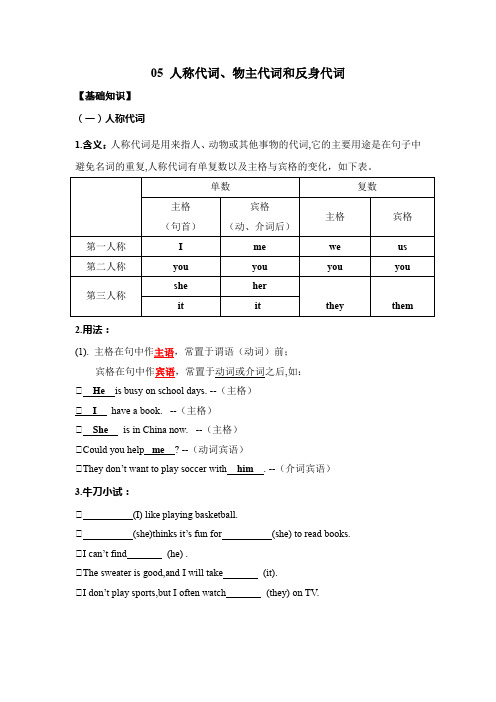
05 人称代词、物主代词和反身代词【基础知识】(一)人称代词1.含义:人称代词是用来指人、动物或其他事物的代词,它的主要用途是在句子中避免名词的重复,人称代词有单复数以及主格与宾格的变化,如下表。
2.用法:(1). 主格在句中作主语,常置于谓语(动词)前;宾格在句中作宾语,常置于动词或介词之后,如:① He is busy on school days. --(主格)①I have a book. --(主格)① She is in China now. --(主格)①Could you help me ? --(动词宾语)①They don’t want to play soccer with him . --(介词宾语)3.牛刀小试:① (I) like playing basketball.① (she)thinks it’s fun for (she) to read books.①I can’t find (he) .①The sweater is good,and I will take (it).①I don’t play sports,but I often watch (they) on TV.(二)物主代词1.含义:物主代词用来表示人和物之间的所有关系,表示...的。
物主代词有形容词性物主代词与名词性物主代词,单复数之分,如下表:2.用法:(1)通常形容词性物主代词相当于形容词,后面必须加名词,不可单独使用。
①my pen我的钢笔①our school我们的学校①her English teacher她的英语老师①The boy under the tree is my brother.①His English book is on the desk.(2)名词性物主代词,后面不能跟名词,如:①This basketball is mine.这球是我的。
①Those books are hers.那些书是她的。
初中英语2024届中考语法复习代词知识讲解

中考英语语法复习代词知识讲解代词是代替名词以及起名词作用的词,大多数代词具有名词和形容词的功能。
一、人称代词、物主代词、反身代词1)人称代词的主格作主语,一般用于动词前。
例句:They have many legs.它们有很多条腿。
2)人称代词的宾格做宾语,通常跟在及物动词或介词后面,也就是我们通常所说的“动宾”和“介宾”。
例句:Let me buy the tickets first.让我先买票。
(let是动词,动宾)I sometimes play badminton with her.(with 是介词,介宾)3)形容词性物主代词在句中作定语,后面必须跟名词。
例句:Put it on her desk.把它放在她的桌子上.(her后面跟的名词desk)These are my family and relatives.这些是我的家人和亲戚。
(my后面跟的是名词family和relatives)4)名词性物主代词用作主、宾、表语,不能与名词连用,相当于“形容词物主代词+名词”。
例句:Those shoes are ours.那些鞋子是我们的。
Mine is the biggest and the most beautiful.我的最大最漂亮。
(句中的ours 和 mine后面都没有名词,所以要用名词性物主代词)5)反身代词在剧中做宾语,起强调作用。
例句:I can sweep the floor (by) myself.我可以自己扫地。
(myself在句中起强调作用,可以在前面加by,也可以不加)6)反身代词的固定搭配help oneself to 随便吃enjoy oneself 玩的开心teach oneself 自学by oneself 亲自例句:Help yourselves to the cakes,children.孩子们,这些蛋糕你们随便吃My brother usually teaches himself Japanese.我哥哥通常自学日语。
初中英语2024届中考语法复习(名词+代词)
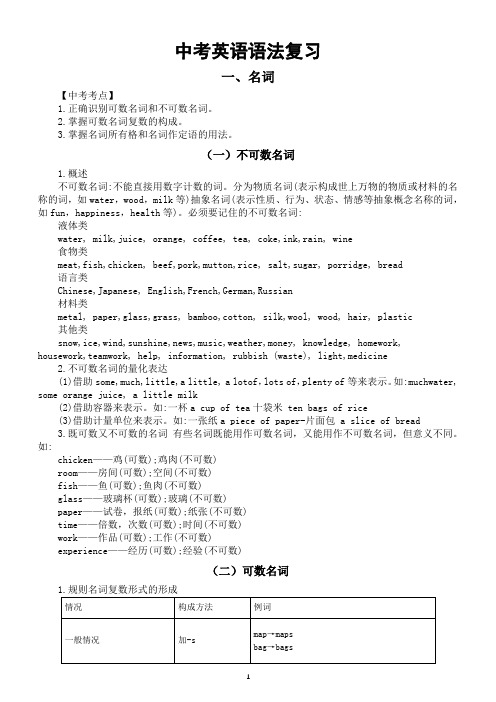
中考英语语法复习一、名词【中考考点】1.正确识别可数名词和不可数名词。
2.掌握可数名词复数的构成。
3.掌握名词所有格和名词作定语的用法。
(一)不可数名词1.概述不可数名词:不能直接用数字计数的词。
分为物质名词(表示构成世上万物的物质或材料的名称的词,如water,wood,milk等)抽象名词(表示性质、行为、状态、情感等抽象概念名称的词,如fun,happiness,health等)。
必须要记住的不可数名词:液体类water, milk,juice, orange, coffee, tea, coke,ink,rain, wine食物类meat,fish,chicken, beef,pork,mutton,rice, salt,sugar, porridge, bread语言类Chinese,Japanese, English,French,German,Russian材料类metal, paper,glass,grass, bamboo,cotton, silk,wool, wood, hair, plastic其他类snow,ice,wind,sunshine,news,music,weather,money, knowledge, homework, housework,teamwork, help, information, rubbish (waste), light,medicine2.不可数名词的量化表达(1)借助some,much,little,a little, a lotof,lots of,plenty of等来表示。
如:muchwater, some orange juice, a little milk(2)借助容器来表示。
如:一杯a cup of tea十袋米 ten bags of rice(3)借助计量单位来表示。
如:一张纸a piece of paper-片面包 a slice of bread3.既可数又不可数的名词有些名词既能用作可数名词,又能用作不可数名词,但意义不同。
九年级英语中考英语总复习之语法篇:(二)代词人教四年制
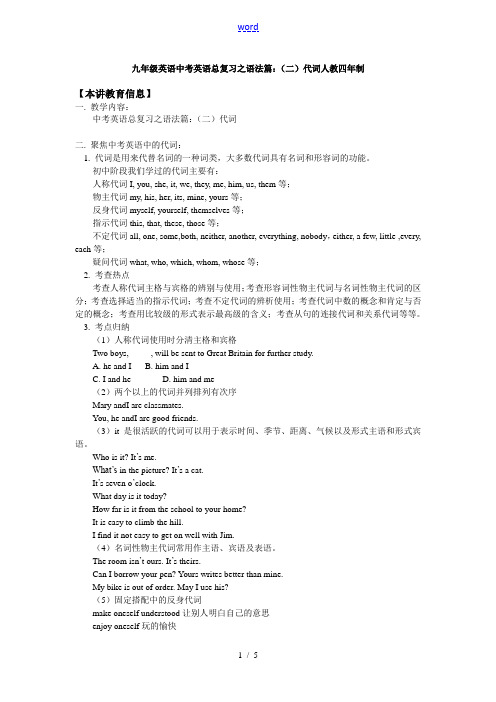
九年级英语中考英语总复习之语法篇:(二)代词人教四年制【本讲教育信息】一. 教学内容:中考英语总复习之语法篇:(二)代词二. 聚焦中考英语中的代词:1. 代词是用来代替名词的一种词类,大多数代词具有名词和形容词的功能。
初中阶段我们学过的代词主要有:人称代词I, you, she, it, we, they, me, him, us, them等;物主代词my, his, her, its, mine, yours等;反身代词myself, yourself, themselves等;指示代词this, that, these, those等;不定代词all, one, some,both, neither, another, everything, nobody,either, a few, little ,every, each等;疑问代词what, who, which, whom, whose等;2. 考查热点考查人称代词主格与宾格的辨别与使用;考查形容词性物主代词与名词性物主代词的区分;考查选择适当的指示代词;考查不定代词的辨析使用;考查代词中数的概念和肯定与否定的概念;考查用比较级的形式表示最高级的含义;考查从句的连接代词和关系代词等等。
3. 考点归纳(1)人称代词使用时分清主格和宾格Two boys, ____ , will be sent to Great Britain for further study.A. he and IB. him and IC. I and heD. him and me(2)两个以上的代词并列排列有次序Mary andI are classmates.You, he andI are good friends.(3)it 是很活跃的代词可以用于表示时间、季节、距离、气候以及形式主语和形式宾语。
Who is it? It’s me.What’s in the picture? It’s a cat.It’s seven o’clock.What day is it today?How far is it from the school to your home?It is easy to climb the hill.I find it not easy to get on well with Jim.(4)名词性物主代词常用作主语、宾语及表语。
- 1、下载文档前请自行甄别文档内容的完整性,平台不提供额外的编辑、内容补充、找答案等附加服务。
- 2、"仅部分预览"的文档,不可在线预览部分如存在完整性等问题,可反馈申请退款(可完整预览的文档不适用该条件!)。
- 3、如文档侵犯您的权益,请联系客服反馈,我们会尽快为您处理(人工客服工作时间:9:00-18:30)。
代词【考点直击】1. 人称代词主格、宾格形式及其主要用法;2. 名词性物主代词与形容词性物主代词的形式、区别及其主要用法;3 反身代词的形式、意义及其主要用法;4 常见不定代词的一般用法;5. 指示代词的一般用法,并了解其在上下文中的指代用法;6. 相互代词的基本用法;7. 疑问代词的基本用法。
8. 关系代词的基本用法。
【名师点睛】代词是代替名词、形容词和数词的词。
按其意义、特征及其在句中的作用分为:人称代词、物主代词、指示代词、反身代词、疑问代词、不定代词和关系代词等。
一. 人称代词1.人称代词的人称、数和格,如下表所示。
2.人称代词有主格和宾格之分。
通常主格作主语,宾格作宾语。
动介之前用主格,动介之后用宾格如:I like table tennis. (作主语)Do you know him?(作宾语)3.人称代词还可作表语。
作表语时用宾格。
如:---Whos is knocking at the door? ---It’s me.4.人称代词在than之后与其他人或事物进行比较时,用主格和宾格都可以。
如:He is older than me. He is older than I am.二. 物主代词1.表示所有关系的代词叫物主代词。
物主代词分形容词性物主代词和名词性物主代词,如下表所示。
2. 形容词性物主代词的作用相当于形容词,可在句中作定语。
例如:Our teacher is coming to see us. This is her pencil-box.3. 名词性物主代词的作用相当于名词,在句中可用作主语、宾语和表语。
Our school is here, and theirs is there.(作主语)三. 指示代词指示代词包括:this,that,these,those。
1. this和these一般用来指在时间或空间上较近的事物或人,that和those 则指时间和空间上较远的事物或人,例如:This is a pen and that is a pencil.We are busy these days.2. 有时为了避免重复提到的名词,常可用that或those代替,例如:Television sets made in Beijing are just as good as those made in Shanghai.3. this 在电话用语中代表自己,that 则代表对方。
例如:Hello! This is Mary. Is that Jack speaking?四. 反身代词英语中用来表示"我自己","你自己","他自己","我们自己","你们自己" 等意义的代词称为反身代词,其形式如表所示。
反身代词可以在句中作宾语,表语,同位语。
1. 作宾语,表示动作的承受者就是动作的发出者,主语和宾语指同一个人或一些人。
He called himself a writer.2. 作表语。
It doesn't matter.I'll be myself soon.The girl in the news is myself.3. 作主语或宾语的同位语,表示亲自或本人。
I myself washed the clothes.(=I washed the clothes myself.)(作主语同位语)You should ask the teacher himself.(作宾语同位语)五. 不定代词不是指明代替任何特定名词的代词叫做不定代词,在句中可作主语、表语、宾语和定语。
现将几个常用的不定代词举例说明如下:1. some与any的区别1)some多用于肯定句,表示“一些,几个”作形容词时,后面可以接不可数名词或可数名词的复数。
Look! Some students are cleaning the library.Some rice in the bag has been sold out.2)any多用于疑问句、条件句和否定句中,表示“一些,任何”用作形容词时,后面可以接不可数名词或可数名词的复数。
If you have any questions, please ask me.There isn't any orange in the bottle.Have you got any tea?3)any和some也可以作代词用,表示“一些”。
any多用于疑问句或否定句中,some多用于肯定句中。
How many people can you see in the picture?I can't see any.If you have no money, I'll lend you some.注意:与some, any结合的词如something, somebody, someone, anything, anyone, anybody在肯定句、否定句、疑问句、条件句中的用法,大致和some, any的用法相同。
4)some用于疑问句的特殊情况:表示委婉的请求时用some,如:Can you give me some help?2. few, a few, little, a little在用法上的区别1)用作形容词:I'm going to buy a few apples.He can speak only a little Chinese.There is only a little milk in the glass.He has few friends.They had little money with them.2)a little和little也可以用作副词,a little表示“有点,稍微”,little表示“很少”。
I'm a little hungry. (修饰形容词hungry)Let him sleep a little. (修饰动词sleep)Mary, go a little faster, please. (修饰副词比较级)She slept very little last night.3. other, the other, another, others, the others的区别。
1)other可以作形容词用,后面可以跟单数或复数名词,意思是“其他的、别的”。
Where are his other books?I haven't any other books except this one.2)the other,表示两个人或物中的“另一个”。
常与one搭配构成“one ..., the other ...”句型。
He has two brothers. One is 10 years old , the other is 5 years old.3)“others”,泛指“另外的人或物”。
常与some搭配构成“some ...., others ...”句型。
Some went to the cinema, others went swimming.4)“the others”表示特指某范围内的“其他的人或物”。
In our class only Tom is English, the others are Chinese.5)another可以作形容词用,修饰后面的名词,意为“另一个”,还可以跟代词one.You can see another ship in the sea, can't you?Mary doesn't want to buy this skirt. Would you please show her another one?当我们说each child, each student或each teacher时,我们想到的是一个人的情况。
而当我们说every child和every student时,我们想到的是全体的情况,every的意思与all接近,表示他们都如此。
Every student loves the English teacher. = All students love the English teacher.5. all和both的用法。
1)all指三者以上,或不可数的东西。
谓语动词既可以用单数,也可以用作复数。
在句中作主语、表语、宾语、同位语和定语。
All of us like Mr Pope. 我们都喜欢Pope先生。
(作主语)= We all like Mr Pope. (作同位语)All the water has been used up. (作主语)That's all for today. (作表语)Why not eat all (of) the fish? (作宾语)All the leaders are here. (作定语)2)both作代词。
①与其他名词或代词并列出现,表示“两个都”。
Lucy and Lily both agree with us.②与“of +代词(或名词)”连用,表示“两者都”。
Both of them came to see Mary.③单独使用,表示“两者(都)”。
Michael has two sons. Both are clever.3)both用作形容词,放在名词之前,修饰该名词,表示“两者都”。
. There are tall trees on both sides of the street.六. 疑问代词疑问代词有who,whom,whose,what和which等。
疑问代词用于特殊疑问句中,一般都放在句首,并在句子中作为某一句子成分。
例如:Who is going to come here tomorrow? (作主语)What is that? (作表语)Whose umbrella is this? (作定语)Whom are you waiting for? (作宾语)七.关系代词关系代词是一种引导定语从句并起,连接主句和从句作用的代词。
关系代词有who, whose, whom, that, which. 它们在句中可用作主语,表语,宾语,定语. 在主句中,它们还代表着从句所修饰的那个名词或代词。
例如:I hate people who talk much but do little.I’m looking at the photograph which you sent me with your letter.【实例解析】1.Mary, please show ________ your picture.A. myB. mineC. ID. me答案:D。
